Irony修辞讲解教学内容
修辞格Irony
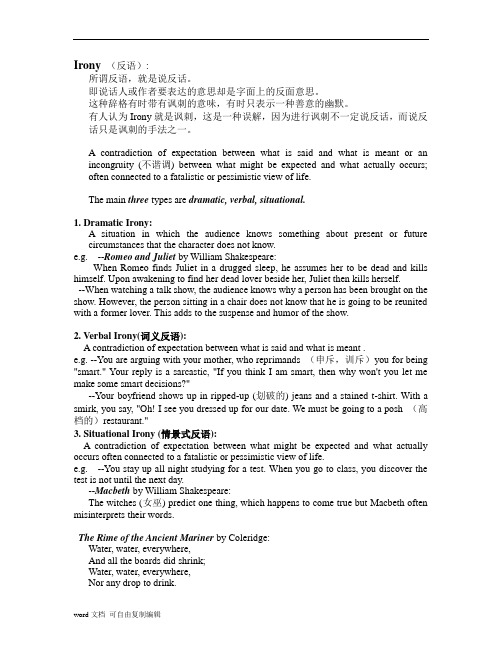
Irony (反语):所谓反语,就是说反话。
即说话人或作者要表达的意思却是字面上的反面意思。
这种辞格有时带有讽刺的意味,有时只表示一种善意的幽默。
有人认为Irony就是讽刺,这是一种误解,因为进行讽刺不一定说反话,而说反话只是讽刺的手法之一。
A contradiction of expectation between what is said and what is meant or anincongruity (不谐调) between what might be expected and what actually occurs;often connected to a fatalistic or pessimistic view of life.The main three types are dramatic, verbal, situational.1. Dramatic Irony:A situation in which the audience knows something about present or futurecircumstances that the character does not know.e.g. --Romeo and Juliet by William Shakespeare:When Romeo finds Juliet in a drugged sleep, he assumes her to be dead and kills himself. Upon awakening to find her dead lover beside her, Juliet then kills herself.--When watching a talk show, the audience knows why a person has been brought on the show. However, the person sitting in a chair does not know that he is going to be reunited with a former lover. This adds to the suspense and humor of the show.2. Verbal Irony(词义反语):A contradiction of expectation between what is said and what is meant .e.g. --You are arguing with your mother, who reprimands (申斥,训斥)you for being "smart." Your reply is a sarcastic, "If you think I am smart, then why won't you let me make some smart decisions?"--Your boyfriend shows up in ripped-up (划破的) jeans and a stained t-shirt. With a smirk, you say, "Oh! I see you dressed up for our date. We must be going to a posh (高档的)restaurant."3. Situational Irony (情景式反语):A contradiction of expectation between what might be expected and what actually occurs often connected to a fatalistic or pessimistic view of life.e.g. --You stay up all night studying for a test. When you go to class, you discover the test is not until the next day.--Macbeth by William Shakespeare:The witches (女巫) predict one thing, which happens to come true but Macbeth often misinterprets their words.The Rime of the Ancient Mariner by Coleridge:Water, water, everywhere,And all the boards did shrink;Water, water, everywhere,Nor any drop to drink.(In this example it is ironic that water is everywhere but none of it can be drunk.) Sarcasm (讽刺,挖苦):指用尖酸刻薄的讽刺话,既可用反语、比喻,也可用直叙法对个人的缺点、过失或社会上的丑恶现象及黑暗而进行讽刺、挖苦,常是有意伤害他人的感情,所以它常含有相当强的贬义。
irony 讽刺 反语
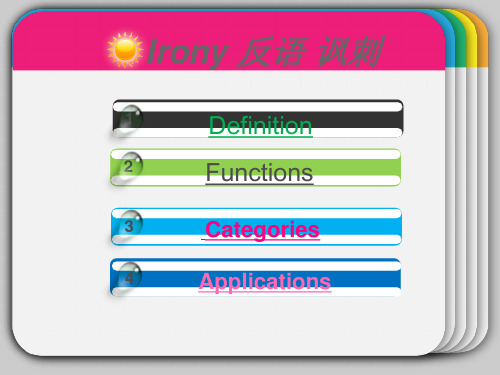
Categories
03
Ironies can be divided into two categories: verbal irony and situational irony. Verbal irony is the simple form of irony. It is used in everyday life.Verbal irony can be subdivided into light irony and heavy irony. 反语通常分为两类:词义反语和情景反语。 情景反语的意义主要从特定的情景中,从 作者对所叙述的事物的真实态度中体现出 来。词义反语从字面意义上就能判断出来, 是常用的表达方式。
For example, when someone hates the weather which spoils his trips and says," what a fine day!" he is ironical. the word "fine" is actually intended to mean "bad", "awful" and "abominable".
@WPS官方微博 @kingsoftwps
我们很幸运。到达彼岸的那一天是12月13 日,那是我们真的感到很愉快。
Situational irony 情景反语
Situational irony occurs when there is a discrepancy or incongruity betthe case and the real state of affairs.
①If people keep telling you to quit smoking cigarette, don't listen...They're probably trying to trick you into living.
报刊文章中的修辞

报刊文章中的修辞这次主要介绍反讽(irony)、头韵(alliteration)和换称(antonomasia)三种修辞手法。
1. 反讽反讽是指用某些词来表达完全相反的意思,以达到讽刺、戏谑、调侃等特定效果。
例如看到打扮得时髦漂亮又女性化的男孩,如果说“good girl”就是反讽。
再如,本来约好去打球,结果却下雨了,这时你如果说“what fine weather for an outing!”就是反讽。
例: I have enough money to last me the rest of my life, unless I buy something.(Time, May 15, 2010)此句中“enough money to last me the rest of my life”说明不缺钱,而后半句却说“unless I buy something”说明只要不买东西就能维持生计。
这样就是在讽刺钱实际上根本就不够。
2.头韵头韵是指在两个或多于两个单词中,第一个辅音读音完全相同,例如“wild wind”“wonderful weather”and“blindas a bat”等。
头韵广泛应用于诗歌、散文和绕口令等文学作品中。
例: In a volume called “A Collection of the Classics”, the section on effective use of leisure time gave the example of Charles Darwin.(The New Yorker, October 26, 2009)句中“Collection”与“Classics”第一个辅音相同,即是押头韵。
3.换称换称是指用一个具有家喻户晓特点的专有名词来作为某种象征。
这个专有名词能引起特性的联想,且这种联想具有相当普遍性。
例如源于《圣经》人物的Solomon代表一个聪明的人。
irony修辞例句

irony修辞例句
当我们说irony时,通常是指人类文化中的一种修辞手法,用来传达出与字面意思相反的潜在含义。
以下是一些irony 修辞的例句:
1. 一位医生,因过量饮酒而死于肝硬化。
2. 在一条巨额赔款的新闻中,评论员评论道:“这家公司正在创造历史。
”
3. 当一位四处弹唱的街头音乐家,没有任何人停下来欣赏他时,他会说自己是“受欢迎的音乐家”。
4. 当一个进食大量包子的人,称自己是“健康饮食”的时候,我们可以说他是“在用反讽的方式描述自己”。
这些例句中,irony都起到了夸张和讽刺的作用,通过字面和隐含的意思之间的对比,强调了一些潜在的暗示或指责。
论英语irony的分类与作用

论英语irony的分类与作用英语irony是一种常见的修辞形式,对于语言研究者来说,研究irony可以帮助我们深入地了解英语语言特征,以及语言的潜在的美感和有趣的表现形式。
本文首先将英语irony的分类进行梳理,然后着重分析irony的作用。
英语irony通常可以分为三类:即体裁irony、情绪irony和意义irony。
体裁irony是指irony的表现形式,一般是指irony的文字表达,它可以通过使用反义词、比喻、拟人和疑问句等修辞手段来表达。
情绪irony主要指irony要表达的情感,它可以通过使用褒贬、引起矛盾或悬疑的语气来表达irony的情绪。
最后,意义irony主要是irony要表达的意义,它可以通过使用对照、暗示、讽刺等修辞手段来表达irony的意义。
英语中的irony有多种作用,首先,irony可以在文学作品中增加情节的趣味性,从而增加作品的魅力。
此外,irony还可以用来表达作家对事件或形势的看法。
例如,作家可以使用irony来表达自己对某一社会现象的反对,并通过讽刺等修辞形式抨击社会现象中不良的一面。
此外,irony还可以用来提升文学作品中人物的人格特征,从而使人物更加生动有趣。
最后,irony还可以用来获得读者的共鸣,从而使文本更e的跳脱单一的表达层次,让文字有更多的层次和思考空间。
由此可见,英语irony的作用十分重要,用于突出文字表达中的某些特殊意义,以及赋予文字有趣和活泼的空间,深受英语读者以及学习者的青睐。
综上所述,英语irony分为体裁、情绪和意义三类,主要作用是增加文字的趣味性,表达作家的看法,提升人物的人格特征,以及获得读者共鸣。
英语irony的广泛使用,犹如一剂强有力的良药,为英语读者的心理世界提供了一种新的视角和看法。
随着英语语言研究的不断深入,irony的作用被更加深入地挖掘和发掘,这将有助于我们更好地理解英语,更好地领略其中的美感。
irony反语解析

• Robbing a widow of her savings was certainly a noble act. (抢劫一位寡妇的储蓄当然是高尚的行为。)
Situational irony
有时,正话反说或反话正说不是靠一两个词所能体现的, 而是要靠语境来体现。所谓“情景式反语”常要有一定的 情景,也即是在整个段落或篇章中蕴含着讽刺,这样的段 落或篇章或许有画龙点睛的词语反语,或许根本没有词语 反语,但整个段落或篇章都是反语,或者准确的说其情景 是反语。 例如在Kate Chopin的短篇小说The story of an hour中, Mallad太太得知丈夫因车祸去世的消息时表面上一阵号哭, 心底里却暗自高,,她早就盼望的一天终于来到了,不禁 低声对自己说:“Free! Body and soul free!” 但正当她暗 自得意时, 丈夫突然出现在门口!原来他大难不死,安 然回家 而 Malled 太太却由于这突如其来的刺激导致心脏 病发作,不治身亡!
dramatic irony
• 戏剧性反语主要用于戏剧小说中,与剧情或戏剧的结构有 关。在这种反语中,读者或观众知晓实情,而台上的人却 一无所知,说一些与实情相悖的话,造成幽默或悲剧性的 效果。 • 例如上文提到过的Kate Chopin的那个故事结尾写道: When the doctors came, they said she had died of heart disease – of joy that kills. (医生们来了,他们说她死于心脏病——是看到丈夫生还,欣 喜至极使她丧了命。) 医生们以为她看到丈夫生还而欣喜至极,以致引发心脏病; 故事的读者不难看到事情正好相反——她是由于庆幸丈夫 去世过于激动了,结果又事与愿违, 受到突然刺激而猝 死的。
高级英语第五课修辞手法分析

高级英语第五课修辞手法分析预览说明:预览图片所展示的格式为文档的源格式展示,下载源文件没有水印,内容可编辑和复制1. Irony(反讽) is the use of words that the opposite of what you really mean, often as a joke and with a tone of voice that shows this.(1)I award this champion only after laborious research and incessant prayer. (L.1, Para.5)(2)It is as if some titanic and aberrant genius, uncompromisingly inimical to man, had devotedall the ingenuity of Hell to the making of them. (L.14, Para.5)(3)It is incredible that mere ignorance should have achieved such masterpieces of horror.(L.11,Para.6)2. Sarcasm(讽刺) is a way of using words that are the opposite of what you mean in order to be unpleasant to somebody or to make fun of them.(1) Obviously, if there were architects of any professional sense or dignity in the region, they would have perfected a chalet to hug the hillsides… (L.6, Para.3)(2) They are incomparable in color, and they are incomparable in design. (L.13, Para.5)3. Ridicule(嘲讽) refers to unkind comments that make fun of somebody/something or make them look silly.(1) When it has taken on the patina of the mills it is the color of an egg long past all hope or caring. (L.2, Para.4)(2) They made it perfect in their own sight by putting a completely impossible penthouse, painteda staring yellow, on top of it. (L.15, Para.8)4. Understatement(低调陈述) is the opposite of hyperbole. It achieves its effect of emphasizing a fact by deliberately understating it, impressing the listeners or the readers more by what is merely implied or left unsaid than by bare statement.(1) The country itself is not uncomely, despite the grime of the endless mills. (L.1, Para.3)5. Antonomasia(换称) is a figure of speech that involves the use of epithet or title in place of a name, and also the use of a proper name in place of a common noun.(1) Safe in a Pullman, I have whirled through the gloomy, God-forsaken villages of Iowa and Kansas, and the malarious tidewater hamlets of Georgia. (L.7, Para5)6. Antithetical Contrast(反衬对比) is a figure of speech combined by antithesis and contrast, and often has two sharply contrasting ideas balanced across a sentence (or neighboring sentences) (1) Here was the very heart of industrial America, the center of its most lucrative and characteristic activity, the boast and pride of the richest and grandest nation ever seen on earth—and here was a sense so dreadfully hideous, so intolerably bleak and forlorn that it reduced the whole aspiration of man to a macabre and depressing joke. (L.5, Para.1)(2) Here was wealth beyond computation, almost beyond imagination—and here were habitations so abominable that they would have disgraced a race of alley cats. (L.10, Para1)7. Hyperbole(夸张) is a way of speaking or writing that makes something should be better, more exciting, dangerous, etc. than it really is.(1) What I allude to is the unbroken and agonizing ugliness, the sheer revolting monstrousness, of every house in sight. (L.2,Para.2)(2) From East Liberty to Greensburg, a distance of twenty-five miles, there was not one in sight from the train that did not insult and lacerate the eye. (L.3, Para.2)(3) But in Westmoreland they prefer that uremic yellow, and so they have the most loathsome towns and villages ever seen by mortal eye. (L.8, Para.4)(4) I have seen, I believe, all of the most unlovely towns of the world; they are all to be found in the United States. (L.2, Para.5)(5) It is as if some titanic and aberrant genius, uncompromisingly inimical to man, had devoted all the ingenuity of Hell to the making of them. (L.14, Para.5)8. Metaphor(暗喻) is a figure of speech that describes something by referring to it as something else, in order to show that the two things have the same qualities and to make the description more powerful.(1) Here was the very heart of industrial America… (L.5, Para.1)(2)…on their low sides they bury themselves swinishly in the mud. ((L.17, Para. 3)(3) And one and all they are streaked in grime, with dead and eczematous patches of paint peeping through the streaks. (L.20, Para.3)(4) The effect is that of a fat woman with a black eye. It is that of a Presbyterian grinning. (L.17, Para.8)(5) Out of the melting pot emerges a race which hates beauty as it hates truth. (L.3, Para.9)9. Simile(明喻) is a figure of speech that often uses the words like or as, etc. to make a comparison between to unlike elements having at least one quality or characteristic in common.(1) …one blinked before them as one blinks before a man with face shot away. (L.7, Para.2)(2) …a crazy little church just west of Jeannette, set like a dormer window on the side of a bare leprous hill… (L.9, Para.2)(3) …a steel stadium like a huge rat-trap somewhere further down the line. (L.12, Para.2)10. Rhetorical Question(修辞疑问句) is a figure of speech in the form of a question posed for its persuasive effect without the expectation of a reply. Rhetorical question encourages the listener to think about what the answer (often obvious) to the question might be.(1) But what have they done? (L.11, Para.3)(2) Was it necessary to adopt that shocking color? (L.4, Para.4)(3) Are they so frightful because the valley is full of foreigners—dull, intense brutes, with no love of beauty in them? (L.1, Para.6)(4) Then why did not these foreigners set up similar abominations in the countries that they came from? (L.2, Para.6)。
irony修辞定义

irony修辞定义
Irony是一种修辞手段,指用相反的意义来表达实际的思想,以增强幽默感、讽刺性或讲话的力量。
具体可分为词义反用法和情景式反语两种形式:
- 词义反用法(antiphrase):用字词表达相反的意思,如“hard-working”表示“懒惰的”。
- 情景式反语(situational irony):主要借助于溢于文中的反语笔触来传达这种意味。
通过运用反讽的手法,作者可以以戏谑、嘲笑或讽刺的方式来表达对现实或观点的批评和思考。
这种修辞手法在口语和书面语中都经常使用,以突出表达者对事物或观点的质疑和不满。
高级英语中的修辞手法总结带课文中例句
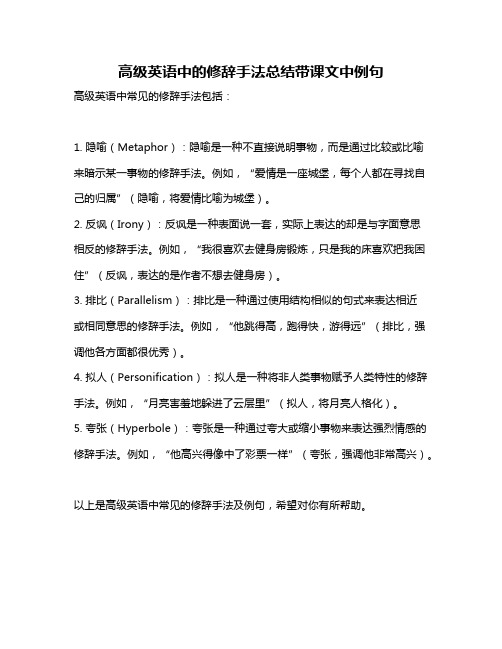
高级英语中的修辞手法总结带课文中例句
高级英语中常见的修辞手法包括:
1. 隐喻(Metaphor):隐喻是一种不直接说明事物,而是通过比较或比喻来暗示某一事物的修辞手法。
例如,“爱情是一座城堡,每个人都在寻找自己的归属”(隐喻,将爱情比喻为城堡)。
2. 反讽(Irony):反讽是一种表面说一套,实际上表达的却是与字面意思
相反的修辞手法。
例如,“我很喜欢去健身房锻炼,只是我的床喜欢把我困住”(反讽,表达的是作者不想去健身房)。
3. 排比(Parallelism):排比是一种通过使用结构相似的句式来表达相近
或相同意思的修辞手法。
例如,“他跳得高,跑得快,游得远”(排比,强调他各方面都很优秀)。
4. 拟人(Personification):拟人是一种将非人类事物赋予人类特性的修辞手法。
例如,“月亮害羞地躲进了云层里”(拟人,将月亮人格化)。
5. 夸张(Hyperbole):夸张是一种通过夸大或缩小事物来表达强烈情感的修辞手法。
例如,“他高兴得像中了彩票一样”(夸张,强调他非常高兴)。
以上是高级英语中常见的修辞手法及例句,希望对你有所帮助。
irony英语修辞学
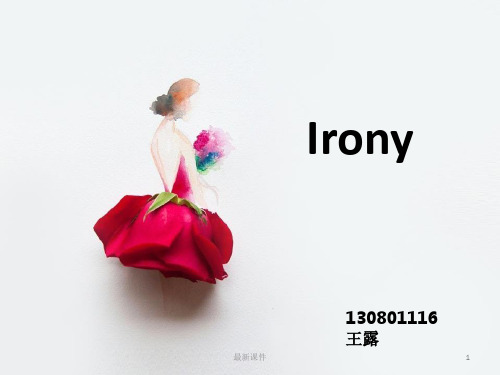
e of a word in such a way as to convey a meaning opposite to the literal meaning of the word.
_____Corbett
最新课件
3
3、A method of humorous or subtly sarcastic expression in which the intended meaning of the words used is the direct opposite of their usual sense.
____Webster's New World Dictionary.
综上所述,我们可以知道。英语中的IRONY就 是我们通常说的“说反语”。它是故意使用与 本意“恰好相反”的词语或句子来表达本意的 一种修辞。
最新课件
4
Function
As irony is the replacement of an expression that is ment by its opposite ,words used in irony are not to be taken literally.Most forms of irony involve the perception or awareness of discrepancy or incongruitybetween words and their meaning,between appearance and reality.
For example,when someone hates the weather which spoils his trips and says ,"what a nice day!" is actually intended to mean "bad", "awful" and "abominable".
高级英语第三版本册1-7课修辞整理
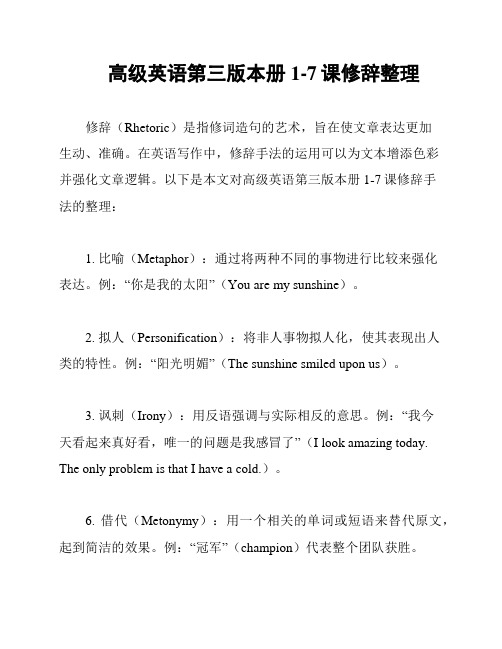
高级英语第三版本册1-7课修辞整理
修辞(Rhetoric)是指修词造句的艺术,旨在使文章表达更加
生动、准确。
在英语写作中,修辞手法的运用可以为文本增添色彩
并强化文章逻辑。
以下是本文对高级英语第三版本册1-7课修辞手
法的整理:
1. 比喻(Metaphor):通过将两种不同的事物进行比较来强化
表达。
例:“你是我的太阳”(You are my sunshine)。
2. 拟人(Personification):将非人事物拟人化,使其表现出人
类的特性。
例:“阳光明媚”(The sunshine smiled upon us)。
3. 讽刺(Irony):用反语强调与实际相反的意思。
例:“我今
天看起来真好看,唯一的问题是我感冒了”(I look amazing today. The only problem is that I have a cold.)。
6. 借代(Metonymy):用一个相关的单词或短语来替代原文,起到简洁的效果。
例:“冠军”(champion)代表整个团队获胜。
7. 倍受争议的说法(Euphemism):用含蓄、委婉和微妙的词语或说法来表达直接或难以接受的事情。
例:“真是一个有趣的人”(He is quite a character)。
以上是高级英语第三版本册1-7课修辞手法整理,希望对大家的英语写作有所帮助。
修辞学 提喻 借喻 Session 9
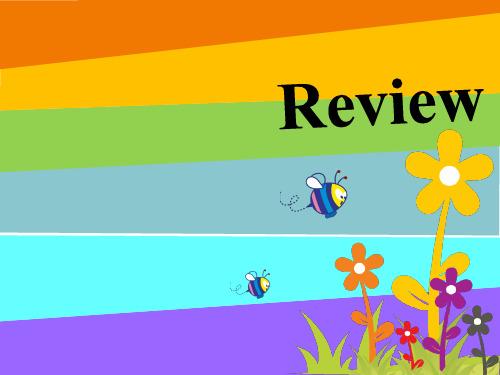
1.4 以属代替种
(以上义词代替下义词)
One day a poor creature who could not have been more than four feet tall crept past me under a vast load of wood.
一天,一个身高不到四英尺的可 怜妇人背着老大一捆柴火从我 身边蹒跚而过。 Analysis:
laurels 月桂树
Rather than resting on our laurels, we have feared getting fat and lazy. Apollo and Daphne: 爱神丘比特为了
向阿波罗复仇,将一支使人陷入爱 情漩涡的金箭射向了他,使阿波罗 而不是在我们的荣誉上休息,我 疯狂地爱上了达芙妮;同时,又将 一支使人拒绝爱情的铅箭射向达芙 们害怕变得肥胖和懒惰。 妮,使姑娘对阿波罗冷若冰霜。当 达芙妮回身看到阿波罗在追她时, 急忙向父亲呼救。河神听到了女儿 的声音,在阿波罗即将追上她时, 将她变成了一棵月桂树。达佛妮虽 然成了树,阿波罗仍然很喜欢她, 他拥抱着树干,树叶沙沙地颤抖着。 “你将成为我的树,”他说,“你 将终年长青,成为胜利者的荣冠。”
借代
不直接说出某人或某事物的名称,而是借用与其密切 相关的名称或其本身的某种属性来称代(吕煦 2004:165)(“换一个说法”)
1.synecdoche [sɪ'nekdəkɪ]提喻 2.metonymy [mɪ'tɒnɪmɪ]借喻
巾帼不让须眉。
朱门酒肉臭,路有冻死骨。--杜甫 《自京赴奉先县咏怀 五百字》
Poet Laureate 桂冠诗人
Soapy stood still with his hands in his pockets and smiled at the sight of brass buttons. ---The Cop and the Anthem
傲慢与偏见中的反讽irony
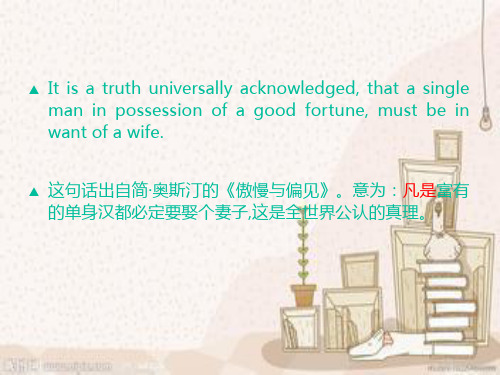
此外,irony 还被人们用来表示一种对世界的认识、态度 和心态:对世界加以描述、分析与推断,或对世界的矛盾 和 对 抗 表现 出 的 一种 冷 静 的 、 超 然 物外 的 态 度等 等 。 Irony作为英语辞格(verbal irony)和汉语的反语基本相 同。
反讽(Irony)
《傲慢与偏见》中的这一开首句无疑可说是整个英语小说 中最著名的开篇语句了。原文里,反讽表现得淋漓尽致, 富有特效。主句使用了一个严肃的大字眼“It is a truth universally acknowledged ”,仿佛在宣读一则放之四 海而皆准的普遍真理和客观规律,然而从句的语调却急转 直下“that a single man must be in want of a wife”, 变得平淡无奇。整部小说的喜剧性反讽基调便由这一突降 法的开篇首句奠定。
Appreciation
首先,这是个强调句(The Emphatic Pattern)。“It is a truth…that…”,加强语气,使表达的观点更强烈鲜明。
其次,这句话用了对比对照修辞手法。对比对照 (antithesis)是文学作品中常见的修辞手法。in possession of 和in want of 形成对照,使有钱单身汉与有 个妻子形成鲜明对照。
反讽(Irony)
反讽作为一种修辞手法,通常指故意用与原意相反的话来 表达本意,以达到谐谑、嘲弄、讽刺、喜爱和亲昵的目的。 英语里 irony 的含义远比汉语里的广泛,它不仅指作为修 辞格的 verbal irony (反语),也指一种文学技巧( a literary device ),主要包括 :verbal irony dramatic irony(戏剧性反语)和situation irony(情况反常)即 literary irony(嘲弄)。
Irony
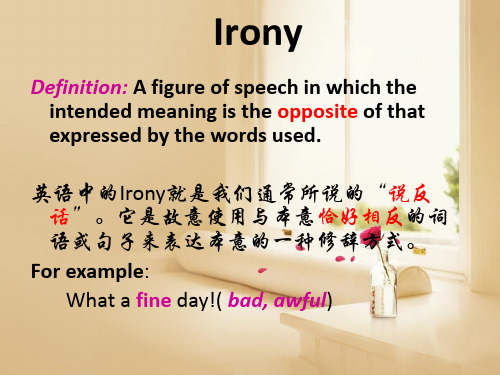
• Light Irony:
b. We are lucky. It’s the other side on the thirteenth of December. That makes us feel really good. (David Parks: G. I. diary)
• (The author means exactly the opposite of what he says: 13 is an unlucky number to most Westerners. Since on that day— December 13, they will land on the other side of the Pacific to fight in the Vietnam War, they don’t feel good at all)
• c. According to the official write-ups in the papers, he’s the best man in the world. He doesn’t have a single defect in his whole body. Why, he does not even have a belly-button! 根据报纸上官方介绍,他是天底下头等大好人, 浑身上下毫无缺点,连肚脐眼都没有。(宗福先 《于无声处》)
• 所谓“情景式反语”常要有一定的情景, 也即是在整个段落或篇章中蕴含着讽刺, 这样的段落或篇章或许有画龙点睛的词语 反语,或许根本没有词语反语,但整个的 段落与篇章都是反语,或者准确的说其情 景是反语。 • For example: In a film,a man and his second wife, on the first night of their honeymoon, are accidentally seated at the theatre next to the man's wife. • we should call this situation ironical.
ironyridiculesarcasm反语,嘲讽,讥讽修辞例句[指南]
![ironyridiculesarcasm反语,嘲讽,讥讽修辞例句[指南]](https://img.taocdn.com/s3/m/8b254de44793daef5ef7ba0d4a7302768e996ff7.png)
Lesson 10 The Trial That Rocked the W orldJohn Scopes第十课震撼世界的审判约翰•司科普斯Bryan, ageing and paunchy, was assisted in his prosecution by his son, also a lawyer, and Tennessee’s brilliant young attorney-general, Tom Stewart. Ridicule布莱恩的样子老态龙钟,大腹便便。
协助他进行起诉工作的有他的儿子—也是个律师—以及田纳西州年轻有为的检察长汤姆•斯图尔特。
After the preliminary sparring over legalities, Darrow got up to make his opening statement. "My friend the attorney-general says that John Scopes knows what he is here for," Darrow drawled. "I know what he is here for, too. He is here because ignorance and bigotry are rampant, and it is a mighty strong combination." Irony履行完规定的法律诉讼程序之后,达罗站起来开始发言了。
“我的朋友检察长先生方才告诉我们说约翰•司科普斯知道他为什么会被带上法庭,”达罗拖长着声音说。
“我也知道他为什么会被带上法庭。
那是因为愚昧和偏见还很猖獗,而且这两者又结合在一起,形成一股强大的势力。
”"Today it is the teachers, " he continued, "and tomorrow the magazines, the books, the newspapers. After a while, it is the setting of man against man and creed against creed until we are marching backwards to the glorious age of the sixteenth century when bigots lighted faggots to burn the men who dared to bring any intelligence and enlightenment and culture to the human mind. " Irony“今天受攻击的是教师,”他接着说道,“明天就会轮到杂志、书籍和报纸。
- 1、下载文档前请自行甄别文档内容的完整性,平台不提供额外的编辑、内容补充、找答案等附加服务。
- 2、"仅部分预览"的文档,不可在线预览部分如存在完整性等问题,可反馈申请退款(可完整预览的文档不适用该条件!)。
- 3、如文档侵犯您的权益,请联系客服反馈,我们会尽快为您处理(人工客服工作时间:9:00-18:30)。
I r o n y修辞讲解
Irony
Definition: 1.an important linguistic phenomenon in our daily life or literary works.
2. saying sth but mean the opposite
3. is a figure of speech, in order to bring emphasis to a particular
truth with deliberately use of language that is contrary to the truth.
Origin: from Greek word “ eironeia”, means “dissimulation(修饰)”
Types:
1.verbal irony--refers to the speaker’s expression and intention comes apart: when a speaker says one thing but actually means annother, or when a literal meaning is contrary to its intended effect.
“great game, Tom.” --when Tom fumbled three times.
又如英国的 Gotham 是有名的愚人村 , 却故意说 :
They are almost as wise as the wise men of Gotham .
他们几乎和愚人村里的愚人一样聪明
2.Situational irony--refers to one’s intention and the action’s result comes apart: the result of an action is contrary to the expected effect. Situational irony results from recognizing the oddness of a given situation, which can be positive or negative.
Situational irony can be also called Circumstantial Irony or Irony of Fate.
再例如凯特·肖邦 (Kate Chopin) 的短篇小说《一小时的故事》 ( The Story of an Hour) 中, 路易丝·马拉德(Louise Mallard) 太太得知丈夫因车祸去世的消息时
表面上一阵号
啕大哭, 内心里却暗自高兴, 她早就盼望这一天的到来, 不禁低声对自己说: “ Free ! Body
and soul free !”但正当她暗自得意时,
丈夫突然出现在门口 ! 原来他大难不死 , 安然回家 ,
而 Mallard 太太却由于这突如其来的刺
激而心脏病发作 , 不治身亡。
3.Dramatic Irony is common in novels and plays. In the novel the words and actions of the characters of a work of literature have a different meaning for the reader than they do for the character.
“ I hope Tom' s better offwhere he is , ” said Sid , “but if he' d been better in some way
—”
“Sid !” Tom felt the glare of the old lady' s
eye , though he could not see it . “ Not a
word against
my Tom , now that he' s gone !” (Mark
Twain : The Adventures of Tom Sawyer)
“我多希望汤姆现在在另外那个世界更
舒服些 , ”席德说 , “不过他从前有些地方
要是不那么顽皮……
“席德 !”汤姆虽然看不见老太太的眼
睛 , 却感觉到她向席德瞪眼睛的神气。
“现在我的汤姆死了 , 不许说他的坏话 !”*这是汤姆的小伙伴席德和波莉姨妈的
谈话。
席德说他希望汤姆在另一个世界
更舒服些 , 本是实话 , 因为他以为汤姆死了。
他说话的对象———波莉姨妈也是这样想的。
但读者知道 , 情况正好相反 , 因为汤姆并没有死。
二、Irony的变异形式
英语修辞格Paradox(似非而是的隽语)、Oxymoron(矛盾修辞法)和Innuendo(暗讽)在
使用中都含有Irony的意思,因此在某些
英语修辞格的论著中把它们称为Irony的变异形式。
1.Paradox
汉语里称这一辞格为“反论”或“逆论”,即乍听起来似乎荒诞、有悖常理而实际上却
含有某种哲理的说法。
如“善骑者堕,善泳者溺”,“淹死的都是会水的”等,其中都包含
有
Irony的意思。
(10)More haste,less speed.欲速则不达。
(11)He that is full of himself is very empty.自命万事通,实乃腹中空。
(12)Cleverness may overreach itself.聪明反被聪明误。
(13)In fact,it appears that some teachers of English teach English so poorly largely because they
teach grammar so well.事实上,有些英语老师英语教得太差,看起来主要是他们的语
法讲的太好。
2.Oxymoron
英语修辞格Oxymoron和汉语修辞格反映类似,它是通过使用两个意思正好相反的
词或
词组来揭示一件事物的矛盾性,通常包含Irony的意思,对一些人或事进行嘲讽,或造成一
种出人意料的、引人入胜的效果。
例如:
(14)Dudley Field Malone called my conviction a“victorious defeat.” (John Scopes:The Trial
That Rocked the WorldP173BookⅠAdvanced English)
杜德理·费尔德·马伦把审判的结果称为一个“胜利的败仗”
3.Innuendo
,是用婉Innuendo汉语称为“暗讽”、“影射”
转的口气讲反话,使语言生动活泼,幽默风趣,或是旁敲侧击,含沙射影。
例如: (16)After three days in Japan,the spinal column becomes extraordinarily flexible. (Jacques
Danvoir:Hiroshima—the Liveliest City in JapanP14BookⅠAdvanced English)
在日本呆三天后,脊梁骨就会变的特别柔软灵活。
*把习惯于鞠躬说成“脊梁骨灵活”,十分幽默有趣。
三、Irony和Sarcasm的联系和区别
Irony(反语)和Sarcasm(讽刺)是两种修辞格,两者有联系,也有区别。
在大多数情况下,使用Irony修辞格是为了讽刺。
有时用Irony修辞格,说的是反话,却没有讽刺的意思,只表现出一种幽默或使语言生动俏皮。
《白蛇传》中,白娘子把许仙叫做“冤家”;一个女孩子说她的男朋友“你真坏”,这些都是Irony, 但绝对不是Sarcasm。
